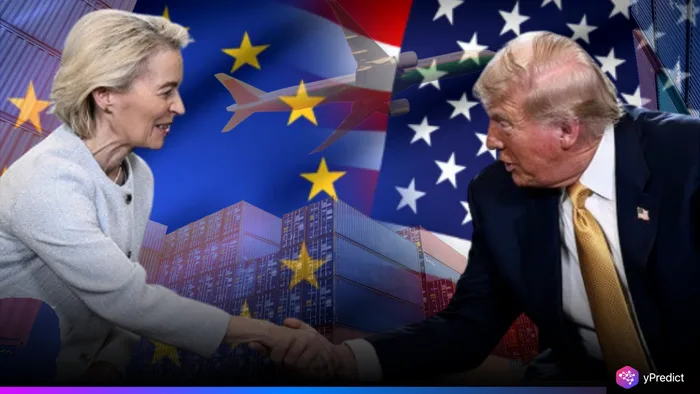
Former President Donald Trump unveiled a groundbreaking deal this week between the United States and European Union. The deal, which is projected to be a value of $1.3 trillion dollars, will have a profound impact to the U.S. economy. With serious commitments from the EU, the deal supports U.S. energy exports, permits historically high European investment into the U.S., as well as frees up U.S. companies to export to a more open and unrestricted market.
There have been incredulous jaw dropping reactions across the global financial world and political spheres to this news. Trump called the deal “HUGE and POWERFUL,” and the numbers coming suggest a valid point of consideration. At a minimum; the EU will invest $600 billion directly into the U.S. economy, buy an additional $750 billion in U.S. energy, and further free U.S. exporters from some trading conditions. This deal is an aggressive and progressive move to reinforce transatlantic ties, while establishing and continuing American economic powers.
$600 Billion European Investment to Power U.S. Growth
One of the biggest components of the US EU trade deal is the EU’s $600 billion commitment to invest in the U.S. These investments will span across infrastructure, tech innovation, energy, and manufacturing. European investors are showing increased confidence in the American economy under this new agreement.
This influx of foreign capital is expected to create thousands of jobs across multiple sectors. From startups to industrial giants, American businesses now have new opportunities to scale with foreign funding. This move also reflects a growing trust in U.S. economic resilience despite global uncertainty.
$750 Billion Energy Deal Supercharges American Exports
The EU’s pledge to purchase $750 billion worth of American energy is a major win for U.S. producers. This includes natural gas, oil, and clean energy technologies. The deal aligns with Europe’s goal of reducing reliance on less stable regions while boosting energy ties with the U.S.
For American energy companies, this opens doors to long-term export contracts. With global energy markets facing volatility, this deal provides a reliable and profitable route for American energy exports. It also strengthens America’s position as a leading global energy supplier.
Open Markets Will Expand U.S. Business Reach
Additionally, the agreement will bring significant trade access improvements for U.S. exporters. From lowering regulatory barriers to removing import restrictions, and promoting bilateral trade particularly in the agriculture, pharmaceuticals, and digital goods sectors, the EU is improving access in a multiple of industries.
This is important for small and mid-sized U.S. companies wanting to access opportunities in European markets. Reducing red tape is vital as it can lead to faster approvals, lower costs, and stronger competitiveness. It further demonstrates that the U.S. is actively advancing global trade discussions and reclaiming its liberal trade leadership role.
Trump Celebrates “America First” Trade Legacy
As Trump spoke to the loyalists, he told them that the deal was proof that good results come from good leadership, referring to the energy and investment numbers as definite undertakings of the success of a deal that is historically ground-breaking. The supporters of the deal hope that it will signal a new wave of trade strength in the United States, particularly as competition from Asia continues to intensify.
Critics do point out that the particles of regulatory enforcement and deadlines should still be tracked. Regardless, the sheer scope and ambition of it makes it one of the most ambitious economic announcement of the year. It signals that the U.S. is serious about reshaping global trade in its favour.







